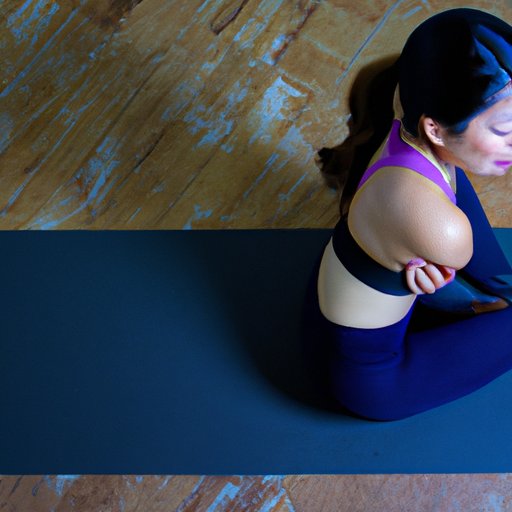Introduction
Anxiety is a common experience for many people, but it can be overwhelming and debilitating if left unaddressed. Whether it’s a result of daily stress or a clinical condition, coping with anxiety is possible with the right tools and coping mechanisms. In this article, we’ll explore practical tips and techniques that can help you manage anxiety and take control of your mental health.
Establishing a Routine
Establishing a daily routine is key to reducing anxiety by providing stability and predictability. Creating a consistent schedule can help you better manage your time and reduce feelings of overwhelm and uncertainty.
Start by creating a list of tasks or activities that you need to do every day. This can include things like work or school obligations, hobbies, exercise, and self-care. From there, determine a consistent schedule for each task, and try to stick to it as best as possible.
It’s also important to leave some time in your routine for relaxation and downtime. This can include engaging in a calming activity like reading or taking a long bath. By prioritizing relaxation and self-care throughout your day, you can help reduce feelings of anxiety and stress.
Practicing Mindfulness
Mindfulness is a technique that involves being present in the moment and paying attention to your thoughts and feelings. It’s a great tool for reducing anxiety because it can help you let go of worries about the future or regrets about the past.
To start practicing mindfulness, you can begin with simple meditation exercises. Set aside a few minutes each day to sit quietly and focus on your breath. Whenever your mind starts to wander, gently guide it back to your breath. This can also be done by focusing on your senses, such as the feeling of the sun on your skin or the sound of birds chirping.
If meditation isn’t your thing, there are plenty of other ways to practice mindfulness. Try going for a walk and paying attention to your surroundings, doing a puzzle, or coloring. The key is to focus on whatever you’re doing in the present moment.
Exercise
Exercise is one of the most effective ways to combat anxiety. Physical activity releases endorphins, which are natural mood-boosters, and can help you feel more relaxed and less stressed.
There are many types of exercise that can be helpful in reducing anxiety, but some of the most effective include yoga, running, and strength training. Find an activity that you enjoy and try to make it a regular part of your routine.
If you’re hesitant to try exercise because of anxiety, start small and gradually increase your activity. You don’t have to run a marathon or lift heavy weights to see the benefits.
Deep Breathing
Deep breathing is a simple but powerful technique for reducing anxiety. When you’re feeling anxious, your breathing often becomes shallow, and you may start to feel lightheaded or dizzy. By taking slow, deep breaths, you can slow your heart rate and calm your nerves.
To practice deep breathing, start by finding a comfortable position. You can sit or lie down, whatever works best for you. Place one hand on your belly and the other on your chest. Take a deep breath in through your nose, making sure that your belly rises as you inhale. Hold your breath for a few seconds, then slowly exhale through your mouth.
Repeat this process several times until you feel more relaxed. You can also practice this technique whenever you feel anxious throughout the day.
Seeking Help
If you’re struggling with anxiety, it’s important to seek help when you need it. There are many professionals who can help, including therapists, psychiatrists, and support groups.
Therapists can help you work through your anxiety and develop coping strategies. Psychiatrists can prescribe medication if necessary. Support groups can provide a safe space to connect with others who are going through similar experiences.
Remember, seeking help is a sign of strength, not weakness. Don’t hesitate to reach out if you’re struggling with anxiety.
Sleep
Sleep is crucial for managing anxiety. When you don’t get enough sleep, your body and mind can become more sensitive to stress and anxiety.
Establishing a regular bedtime routine can help improve the quality of your sleep. Start by setting a consistent bedtime and wake time, even on the weekends. Create an environment that’s conducive to sleep, such as a dark and quiet room. Avoid electronics, like your phone or computer, for at least an hour before bed, as the blue light can interfere with your body’s natural sleep cycle.
Positive Self-Talk
Positive self-talk is a technique for reducing self-criticism and negative thinking patterns. When you’re feeling anxious, you may have thoughts like “I’m not good enough” or “I’ll never be able to do this.”
Instead, try practicing positive affirmations. These are short, positive statements that you repeat to yourself throughout the day. They can help you feel more confident and improve your mood.
Some examples of positive affirmations include:
- I am deserving of love and respect.
- I am worthy of happiness and joy.
- I am capable of overcoming challenges.
Conclusion
Coping with anxiety is possible with the right tools and coping mechanisms. By establishing a routine, practicing mindfulness, exercising, deep breathing, seeking help, improving sleep, and positive self-talk, you can take control of your mental health and reduce feelings of anxiety and stress.
Remember, managing anxiety is an ongoing process, and it’s important to be patient and kind with yourself. By implementing these strategies and seeking help when needed, you can live a happier and healthier life.
